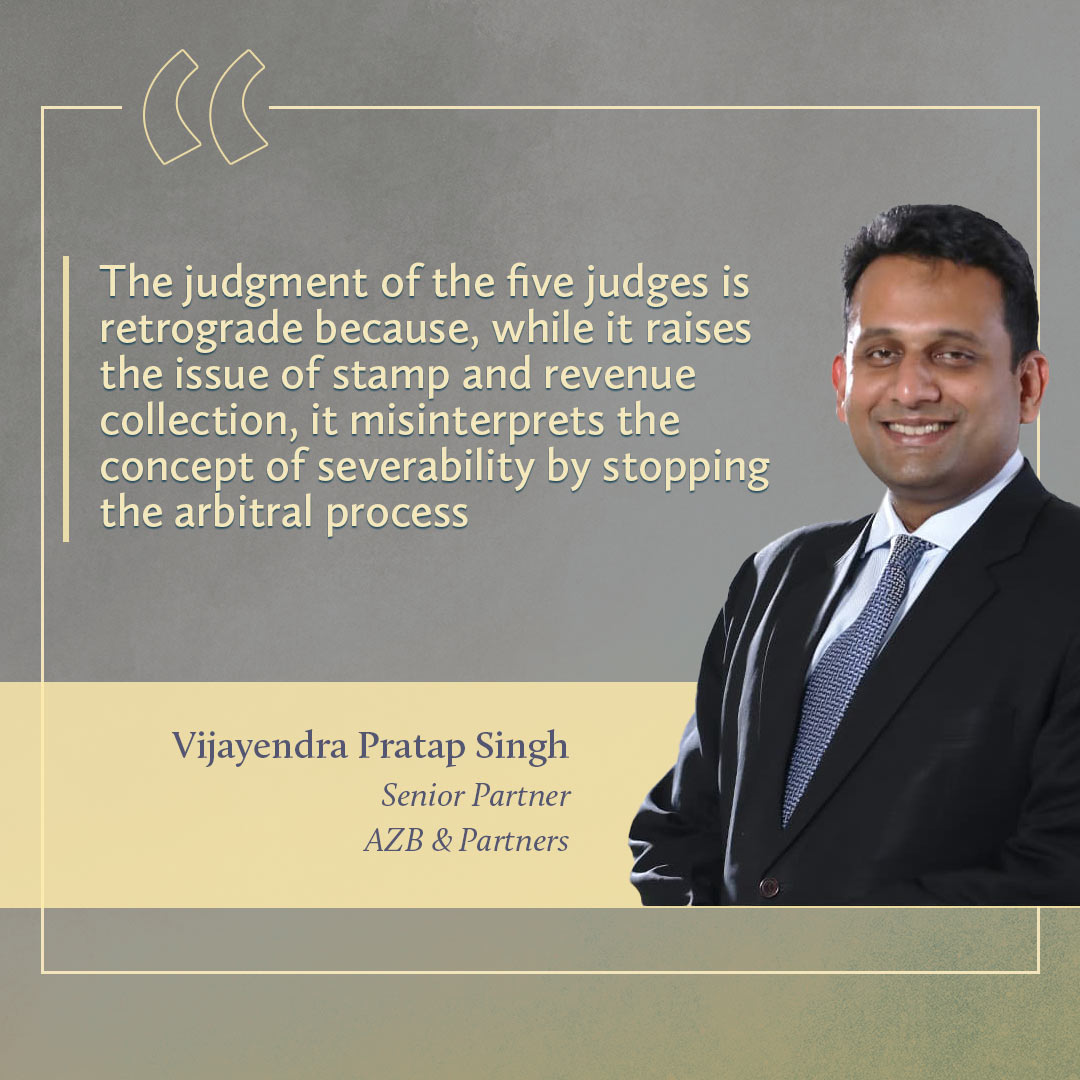The Supreme Court of India has set up a seven-judge bench to reconsider a ruling on unstamped or insufficiently stamped agreements. Indrajit Basu looks at the controversy surrounding the original judgment
Editor’s note
In December 2023, the seven-judge bench unanimously delivered its verdict that unstamped arbitration agreements were legally enforceable and thus set aside the NN Global Mercantile v Indo Unique Flame judgment.
It is not uncommon in India for the highest court to hand down unpopular rulings. But few have raised an outcry like a fractured judgment did early in 2023. According to lawyers, the judgment was not only controversial and retrograde, but also far reaching in its impact on local and cross-border businesses.
In April 2023, a five-judge constitutional bench of the Supreme Court of India (SC) shook up the arbitration community with a judgment in NN Global Mercantile Private Limited v Indo Unique Flame Limited that said unstamped or insufficiently stamped agreements are invalid and not enforceable in law.
While the majority – three judges – ruled that the Indian Stamp Act, 1899, applied to all agreements including local and foreign arbitration contracts, the minority – hence the fractured ruling – felt that the provision in section 11(6A) of the Arbitration and Conciliation Act, 1996, that mandates the appointment of an arbitrator could still enable an unstamped arbitration proceeding.
The minority opinion added that the Indian Stamp Act did not invalidate unstamped instruments and that each case’s facts and circumstances would determine its validity.
However, considering the larger ramifications of the judgment, the court in an unusual and swift move in October 2023 decided to place the matter before a seven-judge bench to reconsider the correctness of the view. A judgment from the new bench, which could lead to a “course-correction” of the five-judgment bench, is being awaited.
Still, the April judgment has ruffled feathers in the legal world. “The judgment of the five judges is retrograde because, while it raises the issue of stamp and revenue collection, it misinterprets the concept of severability by stopping the arbitral process,” says Vijayendra Pratap Singh, senior partner at AZB & Partners.
The Indian Stamp Act requires stamping of all agreements and documents to ensure legality and validity as well as admissibility in court since such agreements can be registered under the Indian Registration Act, 1908, which in turn ensures the stamp act’s enforceability.
However, the Indian Stamp Act also says that not all agreements need to be made on stamp paper or registered, but while making an agreement on non-stamped paper there are certain legal aspects that need to be complied with.
The Indian Contract Act, 1872 also maintains that all agreements that fulfil the essential conditions of free consent, lawful consideration and lawful object are valid and enforceable. Even oral agreements, which constitute the majority share of contracts in India, are valid contracts under the contract act provided they fulfil the essentials of a contract.
Hence, adds Singh, had it not been for the judgment, an unstamped agreement could have still moved forward to the arbitral process after the payment of the nominal stamp duty and penalty of INR2,000 (USD24). The judgment therefore has cut out the possibility of the judiciary taking an agreement to the arbitral process, and that is where it erred, Singh opines.
“It mistook the concept of severability, which implies that the arbitration clause [in a legal contract or an agreement] that determines the right of the parties in an event of the termination of an agreement is separate and distinct from the underlying agreement in which it is housed,” says Singh.
New Delhi-based Milanka Chaudhury, a partner at Trilegal, adds, “The judgment is a backwards step as it has departed from the internationally accepted doctrine on separability of the arbitration agreement.”
Spanner in the works
Adherence to the doctrine of separability in any legal agreement is crucial, according to Mumbai-based Faranaaz Karbhari, a partner at HSA Advocates, who argues that the legitimacy of an arbitration agreement should differ from the issue of its existence.
Previously, judges did not need to determine the legitimacy of an arbitration agreement, that is, whether or not the stamp duty had been lawfully paid, in order to determine its existence.
The majority opinion in the NN Global judgment broadened the court’s power by allowing it to evaluate the status of stamp duty on the document, as opposed to the previous stance in which the court could only determine the prima facie existence of an arbitration agreement.
“The judgment is significant because it creates a technical hurdle towards dispute resolution through arbitration and cuts down the ease of doing business and the ability to resolve disputes in India,” Karbhari adds.
Consequently, the ruling has posed numerous hurdles for lawyers (see HERE).
For instance, all agreements following the judgment require that all contracts or instruments containing an arbitration clause are duly stamped before being produced in a court. When an insufficiently stamped document is produced in any arbitration proceedings that started prior to the April judgment, parties must now take steps to quickly cure the defect by paying the due stamp duty, says Karbhari.
And this, she says, may pose a headwind for initiating arbitration proceedings, delaying them considerably.
“This judgment creates an additional hurdle for the parties to navigate. Any arbitral award issued by an arbitral tribunal constituted under an arbitration agreement, which was not duly stamped at the time of making the arbitral award, will be rendered unenforceable. This only goes to exacerbate the issues faced at the time of enforcing an award,” says Karbhari.
That leads to yet another significant challenge according to experts: that of seeking interim relief under section 9 of the Arbitration and Conciliation Act. This section of the law allows litigants to seek immediate protection for the arbitration subject matter, which functions as a safeguard for the subject matter of the dispute.
There is confusion too. According to Mumbai-based Bhushan Shah, a partner at Mansukhlal Hiralal & Co, on one hand the NN Global decision appears to compel the parties to first prove the adequacy of the stamping before proceeding with submissions on urgent relief. “However, the SC has specifically provided that the NN Global judgment was not pronounced with respect to section 9 of the act. This had led to confusion as to whether interim relief can be granted on an unstamped or insufficiently stamped arbitration agreement,” says Shah.
THE NUANCES OF THE NN GLOBAL JUDGMENT
According to Milanka Chaudhury, partner at Trilegal, the many hurdles the NN Global judgment could create at different stages of the arbitration process are as follows:
- At the appointment stage: The judgment of the Supreme Court introduces a significant hurdle at the first stage of arbitration proceedings, that is, appointment of arbitrators, as the appointing court will also be examining the issue of stamping of the contract.
- If the jurisdiction of the arbitral tribunal is challenged under section 16 of the Arbitration and Conciliation Act, 1996: Since the judgment holds that an unstamped agreement would not be admitted in evidence and cannot be acted on by the tribunal, in cases where parties have appointed arbitrators without the court’s intervention, the arbitral tribunal will examine the validity of the arbitration agreement on the grounds that it is not stamped should a party invoke section 16 of the Arbitration and Conciliation Act.
- If the jurisdiction of the arbitral tribunal is not challenged: If parties do not challenge the jurisdiction of the arbitral tribunal by invoking section 16 of the Arbitration and Conciliation Act, the judgment casts a duty and burden on the arbitral tribunal to examine the stamp duty paid on the arbitration agreement and impound the same where the original is produced and not proceed with the arbitration proceedings until the stamp duty is paid.
- After the passing of the award: In disputes where an award has been passed by the arbitral tribunal on the basis of an unstamped agreement, the losing parties may attempt to resist enforcement of the award on the basis that the arbitration agreement was invalid, being unstamped or insufficiently stamped, and could not have been acted on by the tribunal. Recently, Delhi High Court in its judgment dated 4 July 2023 in ARG Outlier Media Private Limited v HT Media Limited has given some much-needed guidance on how courts may deal with such an issue.
In ARG Outlier, Delhi High Court rejected the contention that the agreement was inadequately stamped and consequently could not have been admitted as evidence. The court observed that once the agreement was admitted in evidence by the arbitrator, the award passed by relying on it cannot be faulted. The court took note of the Supreme Court’s judgment in the NN Global case and held that nonpayment of stamp duty on the underlying agreement would not affect the enforceability and validity of the award.
Only time will tell if other high courts follow the approach laid down by Delhi High Court or take a different approach to deal with such issues, considering that an arbitral tribunal is under a statutory duty to impound the instrument and not act on the same. Thus, if the arbitral tribunal fails to discharge its duty by not impounding the document and continues to act on an unstamped or insufficiently stamped arbitration agreement, the award may be amenable to a challenge under section 34(2)(b)(ii) of the Arbitration and Conciliation Act as being opposed to public policy. Accordingly, the court may set aside such an award.
You must be a
subscribersubscribersubscribersubscriber
to read this content, please
subscribesubscribesubscribesubscribe
today.
For group subscribers, please click here to access.
Interested in group subscription? Please contact us.






























